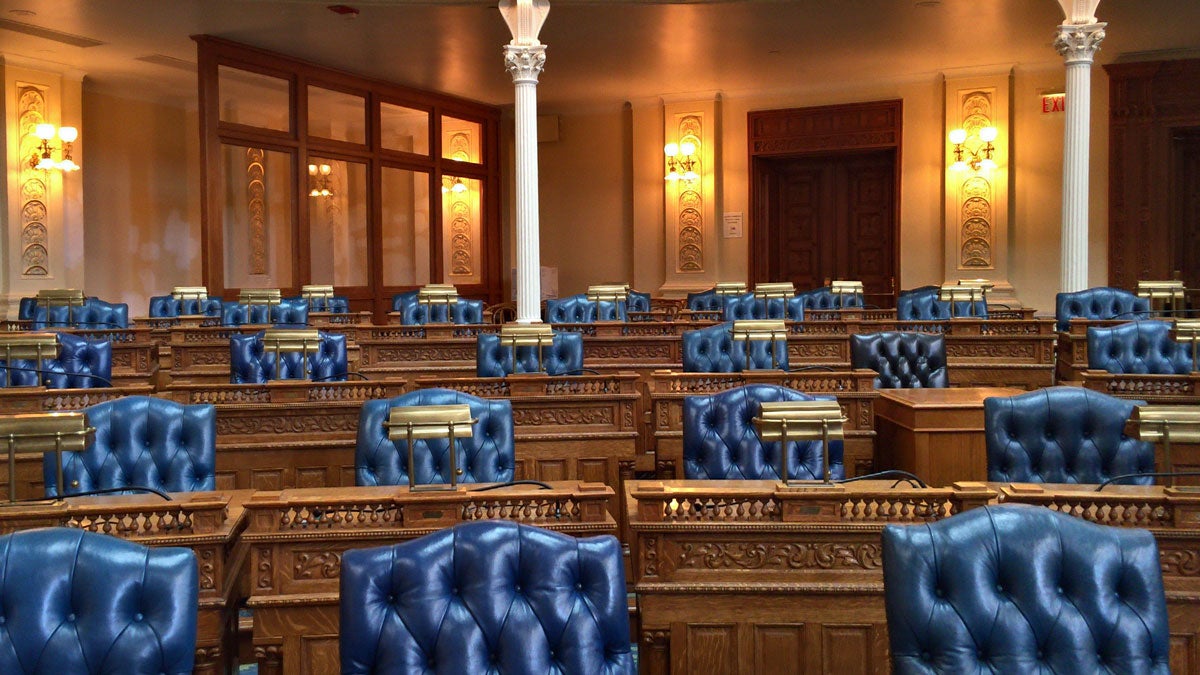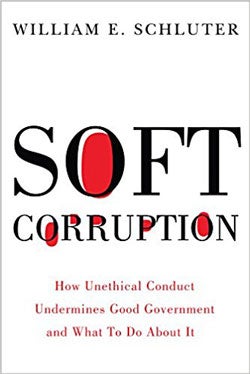How soft corruption works in New Jersey

Interior of the Assembly chamber in the New Jersey Capitol building in Trenton. (Alan Tu/WHYY)
 NJ Spotlight is continuing its annual summer reading series. Every day the news website features an excerpt from a recent book — from nonfiction to novels to poetry – with a New Jersey connection.
NJ Spotlight is continuing its annual summer reading series. Every day the news website features an excerpt from a recent book — from nonfiction to novels to poetry – with a New Jersey connection.
Soft corruption is the type of influence peddling that’s perfectly legal – but unethical. And New Jersey politicians are masters of it. Former state Sen. Bill Schluter, well-known as an ethics crusader, explains what every New Jersey politician knows but you probably don’t: how to have money change hands for political benefit without breaking laws. Schluter even offers a solution for it, for those that want to take up the crusade. In this excerpt, Schluter gets into the details of the many ways New Jerseyans have bought influence while skirting the law.
Excerpt from Soft Corruption: How Unethical Conduct Undermines Good Government and What To Do About It, published February 24, 2017 by Rutgers University Press.
A wealthy sculptor with family problems makes generous campaign contributions in the hope of influencing legislators to enact a law that will help him stop his daughter from receiving a share of the family inheritance. He nearly succeeds. A state legislator dips into his publicly funded office budget to pay the assistant editor of his district’s largest newspaper $2,000 for unspecified general services. The speaker of the state assembly invites lobbyists to contribute $1,500 to her reelection campaign in exchange for the opportunity to talk with her about “your concerns and those of your clients.” Employing an unwritten but tradition-honored practice, a senator single-handedly blocks the governor’s highly qualified nominee for commissioner of education from even coming up for a confirmation vote. A longtime legislator, defeated on Election Day, is handed a position at the state’s parole board, at more than double his legislative salary. He leaves the job a year later, as soon as the resulting 78 percent bump to his state pension takes effect. His response to critics: “If anybody don’t like it, that’s too bad. Let them go spend thirty-three years in office.”
Welcome to New Jersey, home of sandy beaches, bucolic small towns, entertainment legends, high-technology industries . . . and an unfortunate history of government corruption.
Most people associate government corruption with the spectacle of an elected official paraded before news cameras and reporters after being arrested or indicted in connection with crimes committed in public office. We shake our heads, utter a disparaging comment, and then just change the channel or turn the page, resigned to the notion that this is the way things are. A politician breaking the law has become so commonplace that it’s hardly news. Who cares? It happens all the time.
And certainly it happens far too often. Every November, we go to the polls and choose the people who will represent us in government. Later, we watch as they place their left hand on a Bible, raise their right hand, and swear to faithfully uphold the laws of the state. Then time passes, and some of those same hands wind up handcuffed together under a trench coat as the offender is led off to a jail cell.
In recent decades, New Jersey has earned a reputation for criminal corruption at all levels of government—the result of numerous cases that have been exposed and prosecuted.1 But the political culture associated with such malfeasance also breeds another level of wrongdoing that should offend us all as members of a participatory democracy. It occurs when the people who hold public office figure out how to game the system in ways that enrich them and their cronies without breaking any laws. This is soft corruption: unethical transgressions carried out in the quest for political power or personal benefit, achieving results that work against the public interest; and it’s all legal. Most writers about corruption generally define it as political behavior that violates the norms of public office for private, selfish reasons. That definition is fine, except that such behavior can be perfectly legal.
Soft corruption is much more pervasive in public office than most people realize. Consider just a handful of examples, which will be covered in greater detail later in this book:
In 1989, four legislators who would soon occupy their party’s top-ranking seats in the assembly invited twenty high-powered lobbyists to a meeting, ostensibly to solicit their ideas regarding the upcoming election campaign. The real purpose: to shake them down for major campaign contributions from their clients. Those who failed to comply could lose any chance of having legislation favorable to their clients see the light of day.
In 2011, the capable, respected executive director of the state commission charged with investigating violations of the conflict-of- interest law was pressured to resign, so that the governor’s office could replace her with someone of its own choosing.
County clerks are responsible for deciding “by lot” which party’s candidates will be listed on the preferred first line of the general election ballot. By remarkable luck—or something more—the Republican county clerk in Hunterdon selected the GOP for Column A every year from 1999 to 2009. In heavily Democratic Essex County, the Democratic clerk drew his party for the first column thirteen times in a fourteen-year stretch—a streak broken only in the year that the county party was feuding with the Democratic governor.
In 2002, the prominent head of a Newark congregation was appointed as state commerce secretary while retaining his pastorate. It was an unusual arrangement that would soon become untenable. At the same time that the church’s community development program, which he controlled, was actively seeking funding from nearby Jersey City for a housing development with the pastor directly lobbying council members, Jersey City was applying for grants from a state authority chaired by the very same man. Jersey City received funding from the state, and the project proposed by the pastor’s church got its approval and financing from Jersey City.
In the city of Elizabeth, the school board acts as a political machine. Its nine members have accounted for the appointment of twenty relatives to jobs on the district payroll, and the board has leaned on teachers to purchase tickets to political fund-raisers— soliciting right on school property.
• When the police director of New Brunswick retired in 2010, he received more than $375,000 in unused vacation and sick time, along with a $115,000 annual pension from the police and firemen’s pension fund. Six months later, he took advantage of a provision of the fund and applied to be rehired. He soon was earning an annual salary of $120,000—while still collecting his $115,000 yearly pension for the exact same position.
Soft corruption is found in the exploitation of such political and governmental activities as campaign finance, lobbying, patronage, and the electoral process, as well as potential conflicts of interest where a public official acts on government matters that provide personal rewards. Engaging in these processes is not, per se, engaging in soft corruption. They are necessary functions of government that can be performed honestly, fairly, and with integrity. Money has to be raised for political campaigns and can be done honorably; lobbying to represent and express the concerns of interest groups is a normal and desirable phenomenon in our system of self-government; patronage can involve filling government jobs with individuals who are fully qualified; the electoral process can be used to select competent candidates for public office in an open, fair, and transparent manner; and a lawmaker can decline to participate when confronted with a matter that may affect his or her private interest.
It is only when individuals manipulate government functions for reasons of greed, personal advancement, or political advantage that soft corruption occurs. When legislative leaders seek large campaign contributions from special interests that have a stake in pending legislative proposals with an unspoken quid pro quo, that’s soft corruption. When lobbyists conduct fund-raising events for legislative candidates, that’s soft corruption, too. Such practices, all of which pass legal muster, are unethical and work against the public interest. And no one should dismiss them by saying, “That’s politics.”
These examples of soft corruption are part of a political culture in which certain people behave as if the system exists to facilitate their personal gain, not to do the greatest good for the community. Soft corruption leads to the dysfunction we see today at the national and state levels of government, contributing to the public’s lack of confidence in how we the people are represented. Lawmakers who are part of this culture subvert the quality of public policy, thus adversely affecting traditional government responsibilities such as education, health care, transportation, and social services every time they make a decision for reasons other than an honest assessment of the public policy at stake.
A good explanation of the difference between soft and criminal corruption comes from George Washington Plunkitt, a leader of the Tammany Hall political machine of New York City more than one hundred years ago. Plunkitt made a distinction between “dishonest graft” and “honest graft.” The former is bribery, extortion, or other criminal acts used by a government official to gain an advantage or benefit. The latter occurs when the official uses inside information or the power of office to gain a personal benefit. To Plunkitt’s way of thinking, only a fool would engage in dishonest graft when there is plenty of honest graft—soft corruption—to go around. More recently, former New Jersey governor Brendan Byrne captured the distinction this way: “If somebody wants a permit from a local government, and he goes to the mayor and gives him $10,000 cash in an envelope, he’s guilty of a crime. If he . . . handles it right and . . . makes a campaign contribution to the mayor’s campaign, which is perfectly legal, it gets him exactly the same result.”
The struggle against both forms of corruption has been a theme running through many periods of American history. One such period was in the late nineteenth century, when the railroads, utilities, and other corporate giants were able to tell many state legislatures how to vote on such matters as taxes, business charters, and the selection of U.S. senators (who were chosen by the legislatures back then). These commercial enterprises understood the power of states over corporations’ economic well-being and used their money to buy the support of state legislators and political bosses. Such blatant abuses were challenged by President Theodore Roosevelt’s trust-busting reforms—aided by the muckraking journalism of Lincoln Steffens, Ida Tarbell, and others—and to the Progressive movement at the beginning of the twentieth century. A leader of the Progressives, Robert M. La Follette of Wisconsin, realized that government corruption was facilitated by the ability of moneyed interests to put their people into elective office. At the time, candidates for government office were chosen by the bosses and then stood for election. La Follette championed the direct primary to “emancipate the legislature from all subserviency to the corporations,” reasoning that this reform would fumigate special interests from the internal workings of the political parties. Through La Follette’s efforts, Wisconsin approved the direct primary in 1904, and by 1915 all but three states had adopted this reform.
More recently, in the aftermath of the Watergate scandal, public pressure, good-government groups like Common Cause (founded in 1970), and aggressive reporters who exposed unsavory practices prompted state and federal lawmakers to pass reforms designed to bring a higher level of ethics and integrity to government.8 Added stimulus came from advances in electronic data processing, which provided greater transparency in government and made concealing unethical deeds more difficult. Until that point, New Jersey law contained virtually no restrictions on campaign financing or on lobbying. Public officials did not have to make financial disclosures that would reveal conflicts between their public duties and their private business interests. And manipulating the primary ballot structure in the selection of candidates for office was standard operating procedure among political pros. After Watergate, New Jersey enacted laws regulating campaign financing and lobbying, and the conduct of public officials became subject to conflict-of- interest regulations. By the early 2000s, the state had guaranteed open public records and meetings and had partially curtailed “pay-to- play” practices that granted access only to those who contributed to political campaign coffers.
But ever-resourceful politicians and public officials have been able to carve out exceptions and loopholes in these reforms. Moreover, New Jersey has done little to ban dual office-holding, correct patronage excesses, and tackle the reasons for the lack of competition among those seeking elective office. The most significant temptation to engage in soft corruption has been the increasing amount of money now on the political scene. The need to amass enormous campaign war chests places inordinate emphasis on fund-raising and, through it, creates opportunities for major donors to influence policy outcomes and obtain government benefits.
The most dramatic event associated with raising enormous amounts of campaign money was the U.S. Supreme Court’s ruling in Citizens United on January 21, 2010. This decision removes any restrictions on political spending by corporations and unions, so long as the expenditures are made independently. In other words, corporations and unions are now treated the same as individuals and can give unlimited sums on behalf of or in opposition to an identified candidate or issue, providing these expenditures are not coordinated with a specific campaign. State and federal laws still impose restrictions on direct contributions to candidates and parties, such as limiting the amount, disclosing the donor, prohibiting corporate and union giving, and regulating pay to play.
Since Citizens United, special interests have poured vast amounts of money into election campaigns, primarily for federal office but increasingly on the state and local level as well. Clearly, results in these elections will mean that the political agendas of the winners will comport more with the interests of the corporate, union, and fat-cat donors than with the interests of Jane Q. Public. To the extent that Citizens United distorts our principles of representative democracy, this decision is an enabler of soft corruption.
Meanwhile, the volume of direct campaign contributions has also escalated. And these, when made in the context of the unspoken quid pro quo, are the more sinister examples of soft corruption. Laws requiring disclosure of the identities of the donors and recipients of campaign contributions have made it easy to see correlations between the interests providing the money and specific government actions. Examples of donors and the rewards they receive include law firms appointed as counsel to government bodies with high-value retainers, businesses that receive narrowly targeted tax breaks through legislation, labor unions that obtain sweetheart contracts, and developers who receive unwarranted permit approvals. Such arrangements lead cynics to say that the offer of a campaign contribution is a legal bribe, and the solicitation of a contribution is legal extortion. Pretty harsh words, but they all add up to soft corruption.
Countless thousands of public officials—unquestionably a substantial majority—are honorable and do not participate in soft corruption. Likewise, many direct campaign contributions are given to support a candidate or political party whose public policy objectives already match those of the donor and are not meant to influence a specific government outcome. The distinction must be made. Not all contributions are suspect. But contributions that do not pass the smell test—that lead to direct benefits to the donors through government actions that otherwise would not have been taken—are soft corruption at its worst.
Among the many consequences of soft corruption, three are particularly troubling for states like New Jersey: higher-cost government, bad governmental decisions, and an apathetic public.
Used with kind permission of Rutgers University Press. © 2017, all rights reserved.
This book is available on Amazon.
Read more excerpts from the 2017 Summer Reading series
William E. Schluter is a Republican lawmaker who served in both houses of the New Jersey Legislature, and authored two pioneering laws regulating lobbying and campaign finance. Subsequently, he served as chair of the Citizens Clean Elections Commission and vice chair of the State Ethics Commission.
_________________________________________________________
NJ Spotlight, an independent online news service on issues critical to New Jersey, makes its in-depth reporting available to NewsWorks.
WHYY is your source for fact-based, in-depth journalism and information. As a nonprofit organization, we rely on financial support from readers like you. Please give today.




